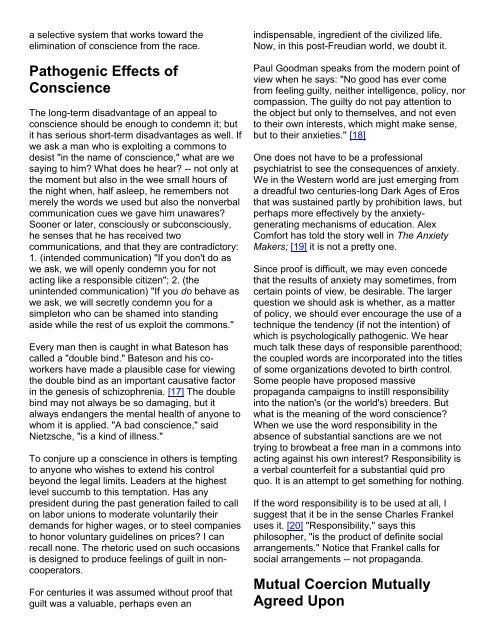The Tragedy of the Commons What Shall We Maximize?
The Tragedy of the Commons What Shall We Maximize?
The Tragedy of the Commons What Shall We Maximize?
You also want an ePaper? Increase the reach of your titles
YUMPU automatically turns print PDFs into web optimized ePapers that Google loves.
a selective system that works toward <strong>the</strong>elimination <strong>of</strong> conscience from <strong>the</strong> race.Pathogenic Effects <strong>of</strong>Conscience<strong>The</strong> long-term disadvantage <strong>of</strong> an appeal toconscience should be enough to condemn it; butit has serious short-term disadvantages as well. Ifwe ask a man who is exploiting a commons todesist "in <strong>the</strong> name <strong>of</strong> conscience," what are wesaying to him? <strong>What</strong> does he hear? -- not only at<strong>the</strong> moment but also in <strong>the</strong> wee small hours <strong>of</strong><strong>the</strong> night when, half asleep, he remembers notmerely <strong>the</strong> words we used but also <strong>the</strong> nonverbalcommunication cues we gave him unawares?Sooner or later, consciously or subconsciously,he senses that he has received twocommunications, and that <strong>the</strong>y are contradictory:1. (intended communication) "If you don't do aswe ask, we will openly condemn you for notacting like a responsible citizen"; 2. (<strong>the</strong>unintended communication) "If you do behave aswe ask, we will secretly condemn you for asimpleton who can be shamed into standingaside while <strong>the</strong> rest <strong>of</strong> us exploit <strong>the</strong> commons."Every man <strong>the</strong>n is caught in what Bateson hascalled a "double bind." Bateson and his coworkershave made a plausible case for viewing<strong>the</strong> double bind as an important causative factorin <strong>the</strong> genesis <strong>of</strong> schizophrenia. [17] <strong>The</strong> doublebind may not always be so damaging, but italways endangers <strong>the</strong> mental health <strong>of</strong> anyone towhom it is applied. "A bad conscience," saidNietzsche, "is a kind <strong>of</strong> illness."To conjure up a conscience in o<strong>the</strong>rs is temptingto anyone who wishes to extend his controlbeyond <strong>the</strong> legal limits. Leaders at <strong>the</strong> highestlevel succumb to this temptation. Has anypresident during <strong>the</strong> past generation failed to callon labor unions to moderate voluntarily <strong>the</strong>irdemands for higher wages, or to steel companiesto honor voluntary guidelines on prices? I canrecall none. <strong>The</strong> rhetoric used on such occasionsis designed to produce feelings <strong>of</strong> guilt in noncooperators.For centuries it was assumed without pro<strong>of</strong> thatguilt was a valuable, perhaps even anindispensable, ingredient <strong>of</strong> <strong>the</strong> civilized life.Now, in this post-Freudian world, we doubt it.Paul Goodman speaks from <strong>the</strong> modern point <strong>of</strong>view when he says: "No good has ever comefrom feeling guilty, nei<strong>the</strong>r intelligence, policy, norcompassion. <strong>The</strong> guilty do not pay attention to<strong>the</strong> object but only to <strong>the</strong>mselves, and not evento <strong>the</strong>ir own interests, which might make sense,but to <strong>the</strong>ir anxieties.'' [18]One does not have to be a pr<strong>of</strong>essionalpsychiatrist to see <strong>the</strong> consequences <strong>of</strong> anxiety.<strong>We</strong> in <strong>the</strong> <strong>We</strong>stern world are just emerging froma dreadful two centuries-long Dark Ages <strong>of</strong> Erosthat was sustained partly by prohibition laws, butperhaps more effectively by <strong>the</strong> anxietygeneratingmechanisms <strong>of</strong> education. AlexComfort has told <strong>the</strong> story well in <strong>The</strong> AnxietyMakers; [19] it is not a pretty one.Since pro<strong>of</strong> is difficult, we may even concedethat <strong>the</strong> results <strong>of</strong> anxiety may sometimes, fromcertain points <strong>of</strong> view, be desirable. <strong>The</strong> largerquestion we should ask is whe<strong>the</strong>r, as a matter<strong>of</strong> policy, we should ever encourage <strong>the</strong> use <strong>of</strong> atechnique <strong>the</strong> tendency (if not <strong>the</strong> intention) <strong>of</strong>which is psychologically pathogenic. <strong>We</strong> hearmuch talk <strong>the</strong>se days <strong>of</strong> responsible parenthood;<strong>the</strong> coupled words are incorporated into <strong>the</strong> titles<strong>of</strong> some organizations devoted to birth control.Some people have proposed massivepropaganda campaigns to instill responsibilityinto <strong>the</strong> nation's (or <strong>the</strong> world's) breeders. Butwhat is <strong>the</strong> meaning <strong>of</strong> <strong>the</strong> word conscience?When we use <strong>the</strong> word responsibility in <strong>the</strong>absence <strong>of</strong> substantial sanctions are we nottrying to browbeat a free man in a commons intoacting against his own interest? Responsibility isa verbal counterfeit for a substantial quid proquo. It is an attempt to get something for nothing.If <strong>the</strong> word responsibility is to be used at all, Isuggest that it be in <strong>the</strong> sense Charles Frankeluses it. [20] "Responsibility," says thisphilosopher, "is <strong>the</strong> product <strong>of</strong> definite socialarrangements." Notice that Frankel calls forsocial arrangements -- not propaganda.Mutual Coercion MutuallyAgreed Upon






